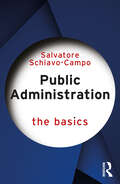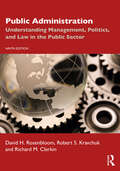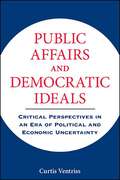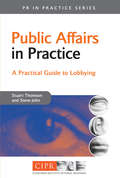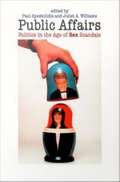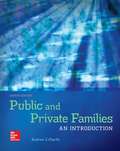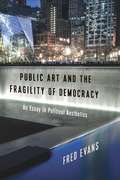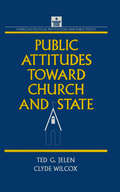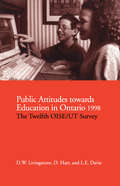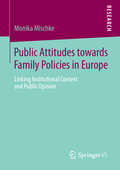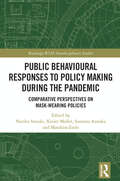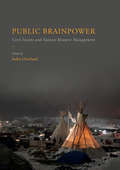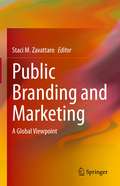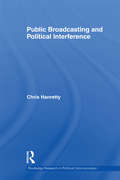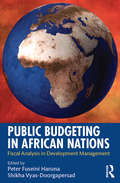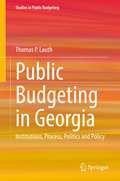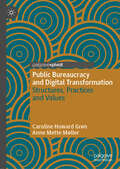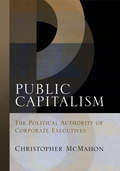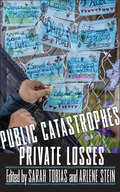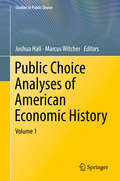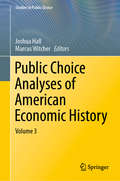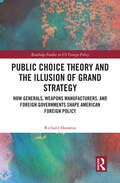- Table View
- List View
Public Administration: Social Change and Adaptive Management
by N. Joseph Cayer David L. Baker Louis F. WeschlerA book of 7 chapters, this text moves from a general discussion of Public Administration to the American Political Context, to theories of organization and management styles. It discusses resource allocation, planning and budgetary systems, and concludes with suggestions for an adaptive approach, improving public administration education, and the new challenges ahead.
Public Administration: The Basics (The Basics)
by Salvatore Schiavo-CampoPublic administration is the set of instruments – the rules, incentives, organizations, information, systems and people – to implement public policy. Public Administration: The Basics is a reader-friendly and up-to-date synthesis of the subject, complete with relatable examples, analogies, and real-world illustrations. The book offers practical insight without jargon and covers all major topics. The first three chapters describe the functions and organizational structure of government; the next three focus on the core issues of the management of public finances, government personnel, and public procurement; the final three chapters address government regulation, the provision of public services, and the interaction between government and the private sector. Public Administration: The Basics is an ideal first book for introductory public administration courses, as well as complementary reading for courses in political science, public economics, and international affairs. The book also serves as an accessible reference for busy policymakers, civil servants, and engaged citizens.
Public Administration: Understanding Management, Politics, and Law in the Public Sector
by David H. Rosenbloom Robert S. Kravchuk Richard M ClerkinThe ninth edition of Public Administration: Understanding Management, Politics, and Law in the Public Sector grounds students in the fundamentals of public administration while embracing its complexity. It describes, explains, and analyzes public administration through the lenses of three well-established perspectives: management, politics, and law. In addition to thoroughly refreshed examples and case studies, significant updates to this new edition include the following: The discussion of management has been collapsed into a single category, contemporary public management, to better reflect the blending of traditional/orthodox and new public management approaches in the field. Significant changes to federal administration initiated by the Trump administration, the emergence of "hyper-" partisanship, major court decisions affecting public administration, and newer scholarship and foci in public administration. A thoroughly rewritten chapter on budgeting and public finance. New public governance material is incorporated throughout the book, including collaborative models for coordinating administration with private organizations, particularly nonprofits. Additional attention is paid to public participation in public administration, including public administration's potential contribution to strengthening democratic citizenship. Thorough discussion of the latest managerial techniques and concepts as well as the contemporary performance orientation in the public sector. Together these revisions reinvigorate the book yet retain its core structure, ideas, and familiarity for students and instructors alike. While the new edition retains its focus on the U.S. context, the focus on managerial, legislative, and judicial functions lends itself well to public administration in many developed nations, making the book a popular choice with instructors around the globe. This time-tested and fully up-to-date textbook is required reading for all students of public administration, public management, and nonprofit management.
Public Affairs and Democratic Ideals: Critical Perspectives in an Era of Political and Economic Uncertainty
by Curtis VentrissWe live in an era where many citizens feel increasingly uncertain about their futures, having to deal with stagnant wages, globalization, and wealth and income inequality, while, at the same time, policymakers appear unable or unwilling to reach any viable policy consensus on a wide range of major issues. Public Affairs and Democratic Ideals addresses these vexing conditions and the challenge they pose for public management and administration. Curtis Ventriss argues for reordering intellectual and policy priorities with a focus on publicness and the role of critical democratic thought in public affairs. Too often, the assumptions that underlie the prevailing theory and practice of addressing major political and economic problems remain unquestioned, with economic and political conflicts displaced into issues of administration and leadership. Ventriss calls for a reinvigorated notion of publicness based, in part, on a public social science, civic experimentation, and policies designed and tailored to the unique needs of various publics. As a way to move forward, this book offers ideas for redefining professionalism, promoting civic initiatives, and rethinking professional education for public service.
Public Affairs in Practice: A Practical Guide to Lobbying (PR In Practice)
by Stuart Thomson Steve JohnPublic Affairs in Practice explains how public affairs (PA) is now much more than just political lobbying. Modern PA includes working with other policy-making bodies, such as regulators, commercial organizations and other interested parties.This is the first book to examine the methods PA professionals use to make an impact. It takes each area of the industry in turn and looks at the tools involved in delivering a PA programme. It also highlights the potential benefits of public affairs, such as protecting an organization from perceived threats of new regulation; identifying new market opportunities; and raising the profile of an organization. Case studies and tips from industry professionals make this a practical "how to" guide for practitioners at all levels and students.Importantly, the authors consider not only established markets the US, UK and Western Europe but also the opportunities presented to companies from these countries by the EU accession states and China, where there are currently very few PA professionals.Finally, there is a discussion of future trends and developments in PA.
Public Affairs: Politics in the Age of Sex Scandals
by Paul Apostolidis Juliet A. WilliamsPublic affairs--or sex scandals--involving prominent politicians are as revealing of American culture as they are of individual peccadillos. Implicated in their unfolding are a broad range of institutions, trends, questions, and struggles, including political parties, Hollywood, the Christian right, new communications technologies, the restructuring of corporate media, feminist and civil rights debates, and the meaning of public life in the "society of the spectacle. " The contributors to Public Affairs examine, from a variety of perspectives, how political sex scandals take shape, gain momentum, and alter the U. S. political and cultural landscape. The essays in Public Affairs reflect on a number of sex scandals while emphasizing the Clinton/Lewinsky affair, certainly the most avidly followed and momentous sex scandal in American political history. Leading scholars situate contemporary public affairs in the context not only of earlier sex scandals in American politics (such as Thomas Jefferson's and Sally Hemings's affair), but also of more purely political scandals (including Teapot Dome and Watergate) and sex scandals centered around public figures other than politicians (such as the actor Hugh Grant and the minister Jimmy Swaggart). Some essays consider the Clinton affair in light of feminist and anti-racist politics, while others discuss the dynamics of scandals as major media events. By charting a critical path through the muck of scandal rather than around it, Public Affairs illuminates why sex scandals have become such a prominent feature of American public life. Contributors. Paul Apostolidis, Jodi Dean, Joshua Gamson, Theodore J. Lowi, Joshua D. Rothman, George Shulman, Anna Marie Smith, Jeremy Varon, Juliet A. Williams
Public And Private Families: An Introduction
by Andrew J. CherlinNationally recognized for its sound scholarship and balanced approach and written by one of the leading authorities in the field, this text examines the family through two lenses: the familiar private family in which we live most of our personal lives, and the public family in which we, as adults, deal with broader societal issues such as the care of the elderly, the increase in divorce, and childbearing outside of marriage. The book looks at intimate personal concerns, such as whether to marry, as well as societal concerns, such as governmental policies that affect families. Distinctive chapters – Chapter 9, “Children and Parents;” Chapter 10, “The Elderly and Their Families;” and Chapter 14, “The Family, the State and Social Policy” – examine issues of great current interest, such as income assistance to poor families, the effects of out-of-home childcare, and the costs of the Social Security and Medicare programs.
Public Art and the Fragility of Democracy: An Essay in Political Aesthetics (Columbia Themes in Philosophy, Social Criticism, and the Arts)
by Fred EvansPublic space is political space. When a work of public art is put up or taken down, it is an inherently political statement, and the work’s aesthetics are inextricably entwined with its political valences. Democracy’s openness allows public art to explore its values critically and to suggest new ones. However, it also facilitates artworks that can surreptitiously or fortuitously undermine democratic values. Today, as bigotry and authoritarianism are on the rise and democratic movements seek to combat them, as Confederate monuments fall and sculptures celebrating diversity rise, the struggle over the values enshrined in the public arena has taken on a new urgency.In this book, Fred Evans develops philosophical and political criteria for assessing how public art can respond to the fragility of democracy. He calls for considering such artworks as acts of citizenship, pointing to their capacity to resist autocratic tendencies and reveal new dimensions of democratic society. Through close considerations of Chicago’s Millennium Park and New York’s National September 11 Memorial, Evans shows how a wide range of artworks participate in democratic dialogues. A nuanced consideration of contemporary art, aesthetics, and political theory, this book is a timely and rigorous elucidation of how thoughtful public art can contribute to the flourishing of a democratic way of life.
Public Attitudes Toward Church and State (American Political Institutions And Public Policy Ser.)
by Clyde Wilcox Ted G. JelenUsing data from the Williamsburg Charter surveys, this book provides a portrait of public attitudes on church-state issues. It examines the social, religious and political sources of differences on issues, making comparisons among Protestants, Catholics, Jews and non-denominational others.
Public Attitudes Towards Education in Ontario, 1998:
by Lynn E. Davie D. Hart D. W. LivingstoneSince 1978, the OISE/UT Survey has been the only extensive analysis of public concerns about educational issues in Canada to be published on a regular basis. The survey profiles current patterns and trends in public opinion about policy options for all levels of education.The twelfth survey is based on interviews conducted in late 1998 with a random sample of 1000 Ontario adults, and questionnaires completed by over 100 randomly selected corporate executives. Trends in attitude changes are presented for the general public and executives. This survey focuses on public support for educational funding and major school governance and programme reforms, as well as the roles of universities and provisions for life-long learning in an emerging knowledge society.The goal of the OISE/UT surveys is to enhance public awareness of educational issues and to encourage informed participation in policy making. Timely, revealing, and easy to read, the survey is recommended for educators at all levels, policy-makers, and the general public.
Public Attitudes towards Family Policies in Europe
by Monika MischkeFamily-policy variation in Europe is still enormous and there is very limited knowledge about the publics' attitudes toward family-policy measures in a comparative perspective. This book addresses this research gap by combing a profound analysis of existing family-policy measures with a thorough analysis of public attitudes. Based on institutional theory, which argues that institutions structure the processes of orientation, the empirical analyses shed light on the relationship between the current family-policy setup, the social context, and public attitudes toward particular family-policy measures in 12 countries of the European Union. The results demonstrate that the social context needs to be taken into account in order to improve our understanding of attitudinal variation among different countries and family-policy contexts. Moreover, this book points out that only few patterns of social polarization are quasi universal whereas many others are specific to individual countries or certain groups of countries.
Public Behavioural Responses to Policy Making during the Pandemic: Comparative Perspectives on Mask-Wearing Policies (Routledge-WIAS Interdisciplinary Studies)
by Masahisa Endo Noriko Suzuki Xavier Mellet Susumu AnnakaThis book provides a comparative study of people's behaviour towards state through mask wearing between European-Northern America and Asian countries. Examining citizens' attitudes towards their state during the COVID-19 pandemic from the perspectives of history, linguistics, politics, economics and sociology, the contributors in this volume explore to what extent people accept the wearing of mask in countries where governments have made it mandatory as compared against countries where people wear masks voluntarily. The book thus looks at mask wearing from a political dichotomy between authoritarianism and liberalism and posits the extent to which political divisions could have existed in public opinion over the measures taken against COVID-19. Filled with invaluable insights through research in 13 countries, this book will appeal to readers in policy making and influencing public opinion from the Europe-Asia comparative study.
Public Brainpower
by Indra OverlandThis book examines how civil society, public debate and freedom of speech affect natural resource governance. Drawing on the theories of Robert Dahl, Jurgen Habermas and Robert Putnam, the book introduces the concept of 'public brainpower', proposing that good institutions require: fertile public debate involving many and varied contributors to provide a broad base for conceiving new institutions; checks and balances on existing institutions; and the continuous dynamic evolution of institutions as the needs of society change. The book explores the strength of these ideas through case studies of 18 oil and gas-producing countries: Algeria, Angola, Azerbaijan, Canada, Colombia, Egypt, Iraq, Kazakhstan, Libya, Netherlands, Nigeria, Norway, Qatar, Russia, Saudi, UAE, UK and Venezuela. The concluding chapter includes 10 tenets on how states can maximize their public brainpower, and a ranking of 33 resource-rich countries and the degree to which they succeed in doing so. The Introduction and the chapters 'Norway: Public Debate and the Management of Petroleum Resources and Revenues', 'Kazakhstan: Civil Society and Natural-Resource Policy in Kazakhstan', and 'Russia: Public Debate and the Petroleum Sector' of this book are available open access under a CC BY 4. 0 license at link. springer. com.
Public Branding and Marketing: A Global Viewpoint
by Staci M. ZavattaroThis edited volume details public branding and marketing from a global, comparative perspective. Place branding and marketing practices are now prominent in cities, states, nations, regions, and organizations all over the world. While disciplines such as hospitality management, tourism marketing, and business marketing have made inroads into understanding the intricacies of place branding, research in public administration and policy is still emerging. This volume fills that research gap. Including accounts from both the academic and practitioner communities, this book bridges the academic-practitioner divide and provides a holistic account of branding and marketing in public organizations as well as immediate application and lessons learned. The book takes an explicit public administration approach, focusing on a wide range of topics such as branding leadership, co-creation, stakeholder engagement, education, non-profit marketing and branding, and city administration. The book is divided into four sections. Section I highlights the process of developing and communicating public branding and marketing efforts. Section II focuses specifically on how social media and other digital technologies are used to communicate and evaluate place branding strategies. Section III centers on branding at the local government level. Section IV highlights how various stakeholder groups come together (or not) when participating in strategic branding efforts. Presenting various methodologies, approaches, and implications of place branding and marketing across differing social, cultural, political, and economic conditions, this book will be of use to scholars and students in public. administration, tourism studies, and business administration as well as professionals and practitioners in the public branding and marketing field.
Public Broadcasting and Political Interference (Routledge Research in Political Communication)
by Chris HanrettyPublic broadcasters, like the BBC and the Italian broadcaster RAI, are some of the most important media organisations in the world. Politicians are often tempted to interfere in the workings of these broadcasters and when this happens, the results are highly controversial, as both the Blair and Berlusconi governments have discovered. Public Broadcasting and Political Interference explains why some broadcasters are good at resisting politicians’ attempts at interference, and have won a reputation for independence – and why other broadcasters have failed to do the same. It takes a comparative approach of broadcasters in different countries, including the United Kingdom, Italy, Spain and Sweden arguing political independence for public service broadcasters is important because of its contribution to democracy allowing voters alternative sources of information which allow them to choose between electoral alternatives. The book will be of interest to be of interest to policy-makers, scholars and students of political communication, broadcasting and the media.
Public Budgeting in African Nations: Fiscal Analysis in Development Management
by Peter Fuseini Haruna Shikha Vyas-DoorgapersadPublic Budgeting in African Nations aims to provide usable budgeting and fiscal policy management information to development practitioners interested in improving the performance of governments in the context of good governance. It shares regional and cross-cultural experiences with international audiences and gives reflective attention to comparative budgeting and fiscal policy management. With a promising economic and fiscal forecast, such information is timely for international development practitioners and for scholars and researchers interested in advancing development management. This book adopts an interdisciplinary/pragmatic approach to analyze and present research findings on public budgeting as a sustainable development tool. The central argument is that development practice will benefit from a bottom-up, decentralized approach to budgeting and fiscal policy management, involving national, sub-national, and civil society institutions. From this perspective, a balanced budget should draw from and reflect values and priorities across the full spectrum of social and political life.
Public Budgeting in Georgia: Institutions, Process, Politics and Policy (Studies in Public Budgeting)
by Thomas P. LauthThis book describes the institutions and process through which the Georgia General Assembly adopts a budget, the executive-legislative branch politics that transpire during the process and the tax and spending policies that the process produces. It argues that the state’s budget is developed by fiscal conservatives within a culture of fiscal conservatism that is conducive to low taxes and low spending. It identifies the patterns and trends of taxing and spending over several decades and during the administrations of nine governors. Its chapter on the line-item veto illustrates the nature of executive-legislative budget relationships in the state. It concludes with an examination of the important milestones in the evolution of Georgia budgeting and a comparison of Georgia with other states on several dimensions. The book offers insights and assessments that will be of interest to budgeting scholars, students of state government, and citizens who want to know more about how government taxing and spending decisions are made.
Public Bureaucracy and Digital Transformation: Structures, Practices and Values (Governance and Public Management)
by Caroline Howard Grøn Anne Mette MøllerThis book assesses how digitalization of public organizations affects their bureaucratic structure and features. Drawing on rich ethnographic data from two highly digitalized government agencies in Denmark, it analyses how digitalization both enhances and distorts fundamental characteristics of Weberian bureaucracy, including division of labour, hierarchy, rules and programmability, and bureaucratic discretion. The book also examines the ways in which digitalization influences demands on employees’ and managers’ expertise and relationships with other organizational actors, and demonstrates the implications of digitalization for the enactment of public bureaucratic values such as legality, transparency, accountability, and responsiveness. In doing so, it provides an analysis of the opportunities and challenges facing public bureaucracies in the digital age. Above all, the book offers a nuanced understanding of how digital transformation reshapes the public bureaucracy, and thereby one of the foundation stones on which our societies stand.
Public Capital and Growth
by Sanjeev Gupta Fabian Bornhorst Serkan Arslanalp Elsa SzeA report from the International Monetary Fund.
Public Capitalism
by Christopher McmahonIn modern capitalist societies, the executives of large, profit-seeking corporations have the power to shape the collective life of the communities, local and global, in which they operate. Corporate executives issue directives to employees, who are normally prepared to comply with them, and impose penalties such as termination on those who fail to comply. The decisions made by corporate executives also affect people outside the corporation: investors, customers, suppliers, the general public. What can justify authority with such a broad reach? Political philosopher Christopher McMahon argues that the social authority of corporate executives is best understood as a form of political authority. Although corporations are privately owned, they must be managed in a way that promotes the public good.Public Capitalism begins with this claim and explores its implications for issues including corporate property rights, the moral status of corporations, the permissibility of layoffs and plant closings, and the legislative role played by corporate executives. Corporate executives acquire the status of public officials of a certain kind, who can be asked to work toward social goods in addition to prosperity. Public Capitalism sketches a new framework for discussion of the moral and political issues faced by corporate executives.
Public Catastrophes, Private Losses (The Feminist Bookshelf: Ideas for the 21st Century)
by Naomi Klein Marcia Gallo Christina Sharpe Ellen Malenas Ledoux Kathleen C. Riley Basuli Deb Marisa J. Fuentes Carmen Vázquez Michelle Commander Jennifer Flynn Walker Bela August Walker Smruthi Bala Kannan Stacy S. Klein Leslye Amede ObioraFrom COVID to climate-change-induced wildfires and hurricanes, we live in an era when catastrophes have become the new normal. But even though these events affect us all, some members of society are more vulnerable to harm than others. This essay collection explores how the definition of catastrophe might be expanded to include many forms of large-scale structural violence on communities, species, and ecosystems. Using feminist methodologies, the contributors to Public Catastrophes, Private Losses trace the connections between seemingly unrelated forms of violence such as structural racism, environmental degradation, and public health crises. In contrast to a news media that focuses on mass fatalities and immediate consequences, these essays call our attention to how catastrophes can also involve slow violence with long-term effects. The authors also consider how these catastrophes are profoundly shaped by government action or inaction, offering a powerful critique of how government neglect has cost lives and demonstrating how vulnerable populations can be better protected. The essays in this collection examine how public catastrophes imprint themselves on lives, as individuals and communities narrate, process, and grapple with legacies of loss. The book is thus a feminist intervention that challenges the binary between public and private, personal and political.
Public Choice Analyses of American Economic History: Volume 1 (Studies in Public Choice #35)
by Joshua Hall Marcus WitcherThis book - the first of two volumes- looks at episodes in American economic history from a public choice perspective. Each chapter discusses citizens, special interests, and government officials responding to economic incentives in both markets and politics. In doing so, the book provides fresh insights into important periods of American history, from the Acadian expulsion in 1755 to the allocation of government grants during the New Deal. This volume features the work of prominent economic historians such as Dora Costa, John Wallis, and Jeremy Atack; well-known public choice scholars such as Jac Heckelman; and younger scholars such as Vincent Geloso and Philip Magness. This book will be useful for researchers and students interested in economics, history, political science, economic history, public choice, and political economy.
Public Choice Analyses of American Economic History: Volume 3 (Studies in Public Choice #39)
by Joshua Hall Marcus WitcherThis book is the third installment in a series of volumes looking at episodes in American economic history from a public choice perspective. Each chapter discusses citizens, special interests, and government officials responding to economic incentives in both markets and politics. In doing so, the book provides fresh insights into important periods of American history, from the Rhode Island’s 1788 Referendum on the U.S. Constitution and the political influence of women’s clubs in the United States. The volume features economic historians such as Ruth Wallis Herndon, junior public choice scholars such as Jayme Lemke and Leo Krasnozhon, and political scientists such as Michael Faber. This volume will be useful for researchers and students interested in economics, history, political science, economic history, public choice, and political economy.
Public Choice III
by Dennis C. MuellerThis book represents a considerable revision and expansion of Public Choice II (1989). Six new chapters have been added, and several chapters from the previous edition have been extensively revised. The discussion of empirical work in public choice has been greatly expanded. As in the previous editions, all of the major topics of public choice are covered. These include: why the state exists, voting rules, federalism, the theory of clubs, two-party and multiparty electoral systems, rent seeking, bureaucracy, interest groups, dictatorship, the size of government, voter participation, and political business cycles. Normative issues in public choice are also examined including a normative analysis of the simple majority rule, Bergson-Samuelson social welfare functions, the Arrow and Sen impossibility theorems, Rawls's social contract theory and the constitutional political economy of Buchanan and Tullock.
Public Choice Theory and the Illusion of Grand Strategy: How Generals, Weapons Manufacturers, and Foreign Governments Shape American Foreign Policy (Routledge Studies in US Foreign Policy)
by Richard HananiaThis book argues that while the US president makes foreign policy decisions based largely on political pressures, it is concentrated interests that shape the incentive structures in which he and other top officials operate. The author identifies three groups most likely to be influential: government contractors, the national security bureaucracy, and foreign governments. This book shows that the public choice perspective is superior to a theory of grand strategy in explaining the most important aspects of American foreign policy, including the war on terror, policy toward China, and the distribution of US forces abroad. Arguing that American leaders are selected to respond to public opinion, not necessarily according to their ability to formulate and execute long-terms plans, the author shows how mass attitudes are easily malleable in the domain of foreign affairs due to ignorance with regard to the topic, the secrecy that surrounds national security issues, the inherent complexity of the issues involved, and most importantly, clear cases of concentrated interests. The book will be of interest to students and scholars of American Studies, Foreign Policy Analysis and Global Governance.

